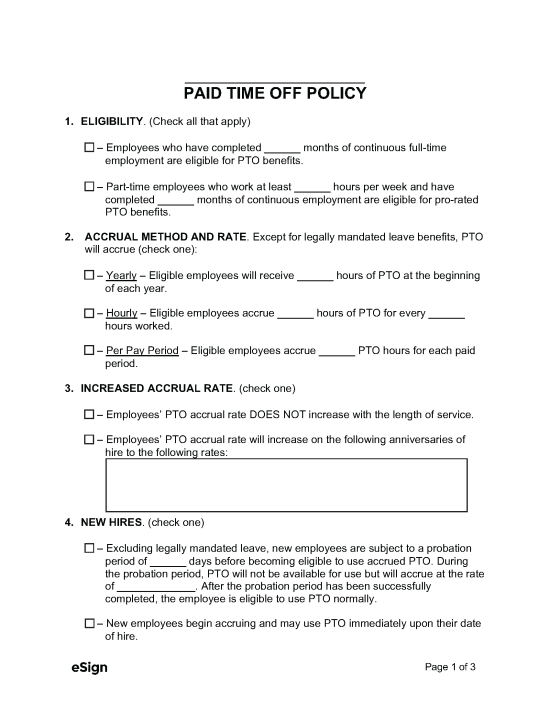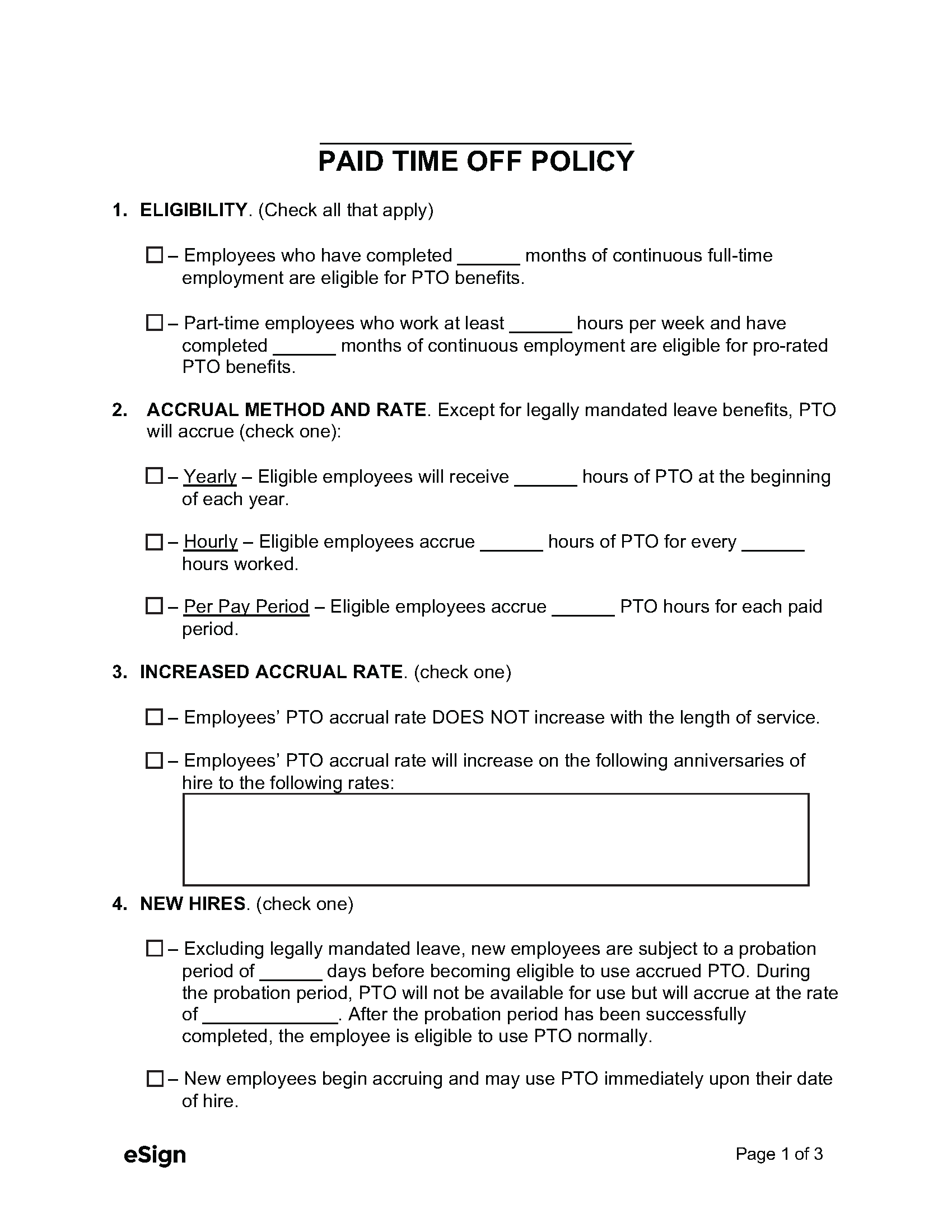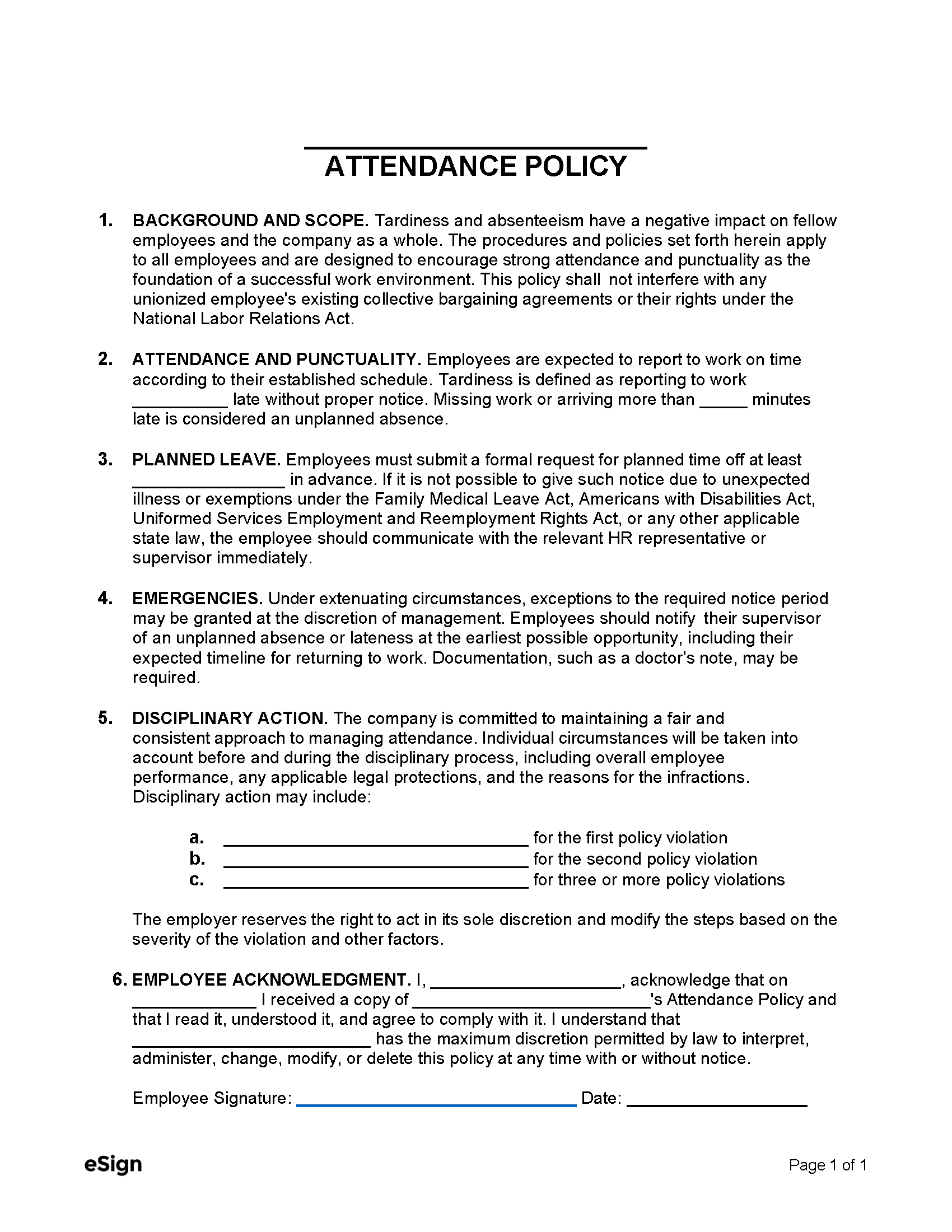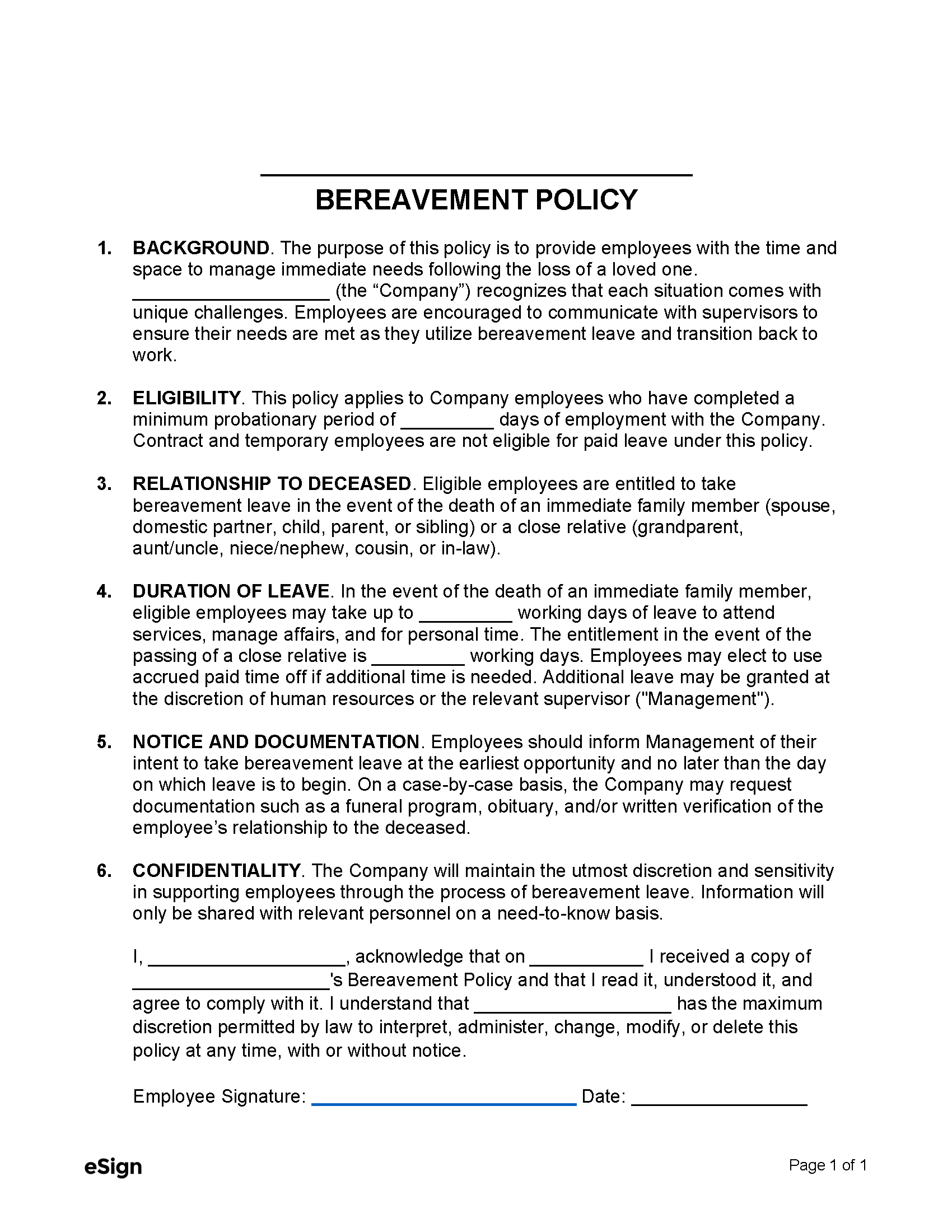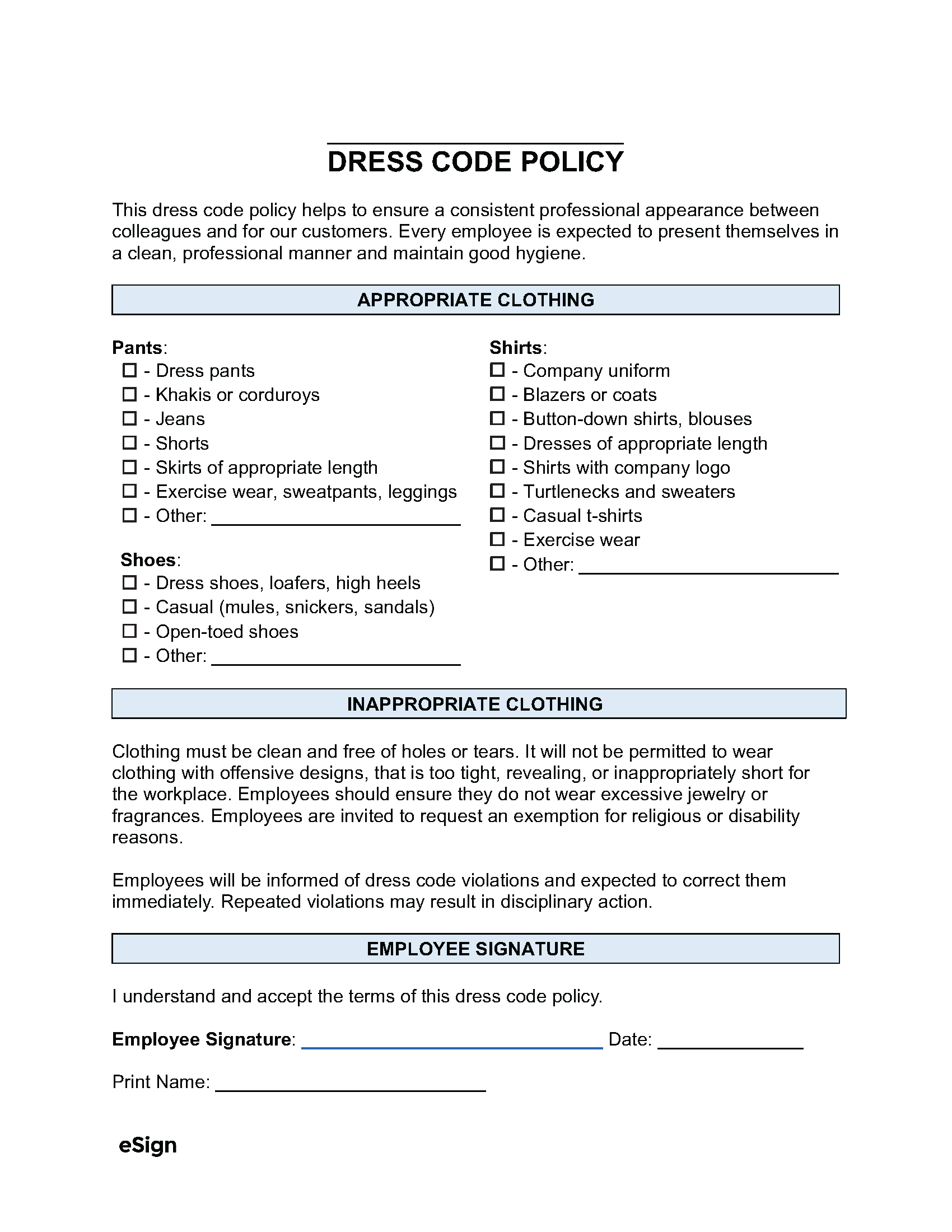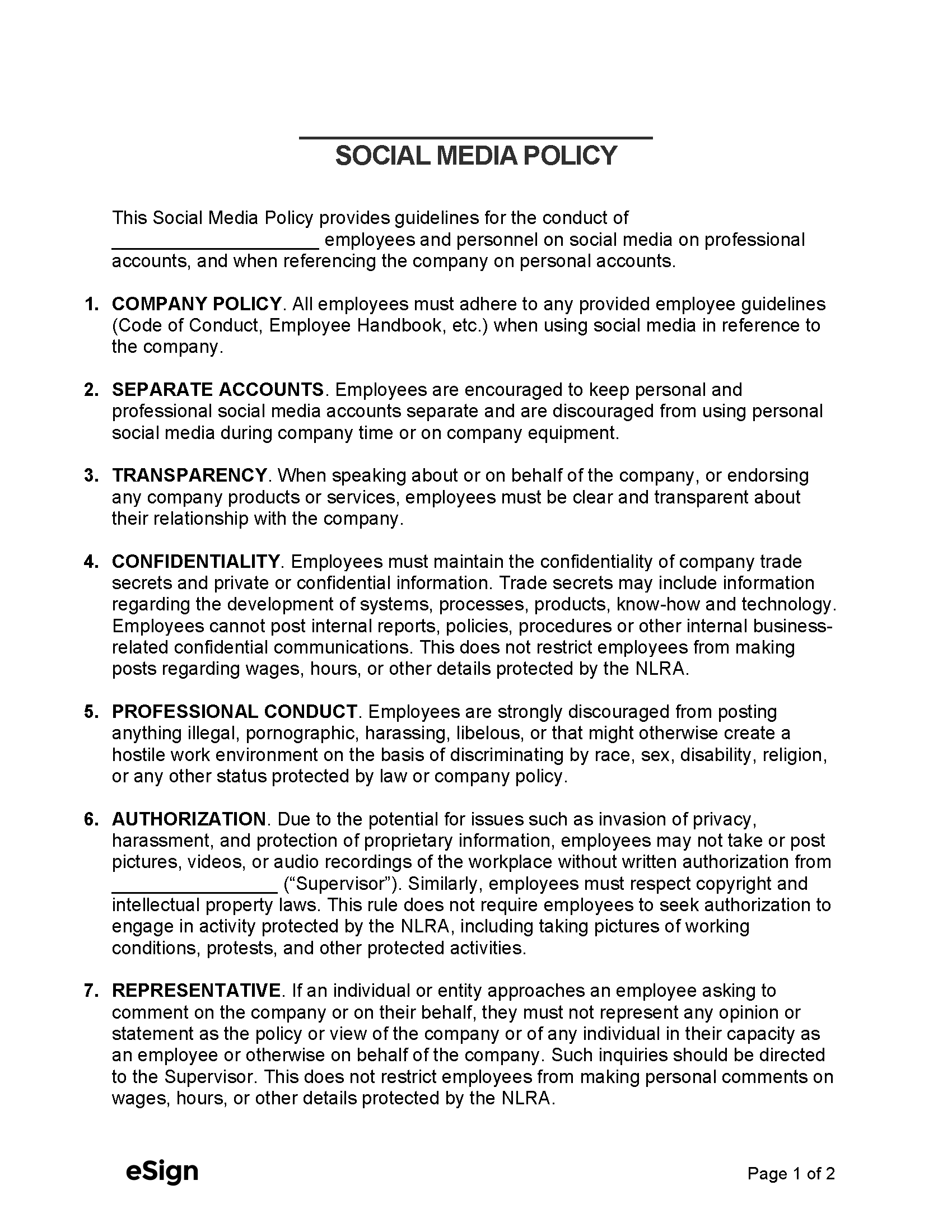By Type (5)
Company Policies
Employers generally have discretion as to what to include in their company policy or employee handbook. They may also choose to amend it at a later date or implement new policies in response to changing circumstances.
Generally speaking, an employee’s signature on a policy form does not render it legally binding. However, it can prove that the employee received and understood company rules, and can be helpful when carrying out disciplinary action.
Equal Employment Opportunity
Certain laws and rules, such as those found in the Equal Employment Opportunity (EOO) Act, will apply regardless of whether they are stated in a covered employer’s policies/handbook. Employers who are not covered by the FMLA or EEOA may still choose to include these protections in their company policy.
Sample
1. ELIGIBILITY. (Check all that apply)
☐ – Employees who have completed [#] months of continuous full-time employment are eligible for PTO benefits.
☐ – Part-time employees who work at least [#] hours per week and have completed [# MONTHS] months of continuous employment are eligible for pro-rated PTO benefits.
2. ACCRUAL METHOD AND RATE. Except for legally mandated leave benefits, PTO will accrue (check one):
☐ – Yearly – Eligible employees will receive [#] hours of PTO at the beginning of each year.
☐ – Hourly – Eligible employees accrue [#] hours of PTO for every [#] hours worked.
☐ – Per Pay Period – Eligible employees accrue [#] PTO hours for each paid period.
3. INCREASED ACCRUAL RATE. (check one)
☐ – Employees’ PTO accrual rate DOES NOT increase with the length of service.
☐ – Employees’ PTO accrual rate will increase on the following anniversaries of hire to the following rates: [DESCRIBE ANNIVERSARIES AND RATE INCREASES]
4. NEW HIRES. (check one)
☐ – Excluding legally mandated leave, new employees are subject to a probation period of [#] days before becoming eligible to use accrued PTO. During the probation period, PTO will not be available for use but will accrue at the rate of [ACCRUAL RATE]. After the probation period has been successfully completed, the employee is eligible to use PTO normally.
☐ – New employees begin accruing and may use PTO immediately upon their date of hire.
5. USING PTO. To use PTO, employees must submit a request to their supervisor or manager [#] weeks in advance of the requested time off, except in cases of emergencyillness, family leave, or any other state or federally mandated allowances for absence from work.
6. SEASONAL RESTRICTIONS AND BLACKOUT DATES. (check one)
☐ – Seasonal Restrictions – Excluding legally mandated leave, at management’s discretion, based on workload and availability of coverage, PTO requests may not be approved if the request includes a day or days that fall on, or within, the dates of: [DATES].
☐ – Blackout Dates – Excluding legally mandated leave, PTO requests will not be approved if the request includes a day or days that fall on, or within, the dates of: [DATES].
☐ – Unrestricted – PTO is not restricted seasonally or by specific dates.
7. CARRY OVER. (check one)
☐ – Any unused PTO at the end of the year will be carried over to the following year.
☐ – Carry over is not permitted. Excluding legally mandated leave, employees forfeit any unused PTO at the end of the year.
8. MAXIMUM PTO ACCRUED. (check one)
☐ – The maximum PTO that an employee may accrue is [#] hours. PTO benefits will cease to accrue for employees who have reached the maximum permitted number of hours.
☐ – The maximum PTO that an employee may accrue is unlimited.
9. PAYOUT. (check one)
☐ – Employees will receive a payout for accrued and unused PTO. The payout will be based on the employee’s pay rate, and the number of hours accrued at the time of separation will receive a payout for accrued and unused PTO at the end of their employment.
☐ – Unused PO will not be paid out at the end of their employment.
10. REINSTATEMENT. (check one)
☐ – If an employee is rehired within [#] months, any unused PTO that was not paid out at the time of separation will be reinstated.
☐ – Employees forfeit any remaining unused PTO benefits upon separation from employment.
11. OTHER TERMS AND CONDITIONS.
[DESCRIBE ANY OTHER TERMS/CONDITIONS]
12. ACCEPTANCE.
I, [EMPLOYEE NAME], acknowledge that on [MM/DD/YYYY], I received a copy of [EMPLOYER NAME]‘s Paid Time Off (PTO) Policy. I have read and understand the policy, and I agree with the terms outlined in it. I understand that [EMPLOYER NAME] has the maximum discretion permitted by law to change or modify this policy at any time, with or without notice.
Employee Signature: Date: ______________
